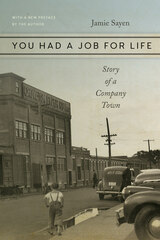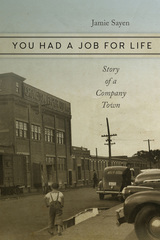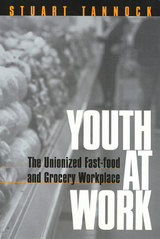7 start with Y start with Y

Absentee owners. Single-minded concern for the bottom line. Friction between workers and management. Hostile takeovers at the hands of avaricious and unaccountable multinational interests. The story of America’s industrial decline is all too familiar—and yet, somehow, still hard to fathom. Jamie Sayen spent years interviewing residents of Groveton, New Hampshire, about the century-long saga of their company town. The community’s paper mill had been its economic engine since the early twentieth century. Purchased and revived by local owners in the postwar decades, the mill merged with Diamond International in 1968. It fell victim to Anglo-French financier James Goldsmith’s hostile takeover in 1982, then suffered through a series of owners with no roots in the community until its eventual demise in 2007. Drawing on conversations with scores of former mill workers, Sayen reconstructs the mill’s human history: the smells of pulp and wood, the injuries and deaths, the struggles of women for equal pay and fair treatment, and the devastating impact of global capitalism on a small New England town. This is a heartbreaking story of the decimation of industrial America.


---Nicholas Coles, University of Pittsburgh
---Alan Wald, University of Michigan

Rooting the movement in contemporary economic structures and social ideology, Young America examines this urban and working-class "agrarianism," demonstrating how the political preoccupations of this movement transformed socialism by drawing its adherents from communitarian preoccupations into political action. The alliance of the NRA's land reformers and radical abolitionists led unprecedented numbers to petition Congress and established the foundations of what became the new Republican Party, promising "Free Soil, Free Labor, Free Men."

“This is the book to throw at your human resources director—not literally, of course—when any attempt is being made to bamboozle you about how decisions on pay have been made…It is a closely argued, thoroughly researched treatise on how we got here and how pay could be both fairer and more effective as a reward.”
—Stefan Stern, Financial World
“A flat-out revelation of a book by one of the nation’s top scholars of the labor market…required reading for anyone who cares about the future of work in America.”
—Matthew Desmond, author of Poverty, by America
“Jake Rosenfeld pulls back the curtain on the multifaceted cultural, institutional, and market forces at play in wage-setting. This timely book illuminates the power dynamics and often arbitrary forces that have contributed to the egregious inequality in the U.S. labor market—and then lays out a clear blueprint for progressive change.”
—Thea Lee, President of the Economic Policy Institute
Job performance and where you work play a role in determining pay, but judgments of productivity and value are highly subjective. What makes a lawyer more valuable than a teacher? How do you measure the output of a police officer, a professor, or a reporter? Why, in the past few decades, did CEOs suddenly become hundreds of times more valuable than their employees? The answers lie not in objective criteria but in battles over interests and ideals.
Four dynamics are paramount: power, inertia, mimicry, and demands for equity. Power struggles legitimize pay for particular jobs, and organizational inertia makes that pay seem natural. Mimicry encourages employers to do what their peers are doing. And workers are on the lookout for practices that seem unfair. Jake Rosenfeld shows us how these dynamics play out in real-world settings, drawing on cutting-edge economics and original survey data, with an eye for compelling stories and revealing details.
You’re Paid What You’re Worth gets to the heart of that most basic of social questions: Who gets what and why?

This interview-based study of 95 young unionized fast-food and grocery workers in two cities in the U.S. and Canada presents a detailed account of their experiences in their workplaces and in their unions. These young workers vividly describe their daily tasks of frying, serving, bagging, stocking, and cleaning up, and the pressures from management and customers that surround these tasks. Management control tactics they encounter include video surveillance, drug testing, and monitoring of worker service scripts by mystery shoppers. The workers also document the hazards -- muscle injuries, burns, and robberies -- and the responsibilities of their jobs, including the emotional labor of customer relations.
The book suggests that young service sector workers have a distinct workforce identity as "stopgap workers." Society, employers, and even some unions often dismiss young workers as not being "real" workers, since these youths are seen as being in transition between school and "adult" career forms of employment. The collective activism of unions may offer hope not just for improving service sector work, but for educating young workers and providing them with a voice in shaping their own temporary work conditions.

The economic deregulation that followed the East Asian financial crisis and recession in the 1990s blocked youth from the labor market. This issue investigates the resulting youth labor crisis and its predominant manifestations—youth unemployment and underemployment. The contributors examine these phenomena not as social anomalies but as the new faces of labor for youth. They conceptualize this situation as emblematic of a global crisis in capitalism and study how the politics of youth unemployment and underemployment emerge interconnected in China, Japan, and South Korea. The essays highlight how political leaders in these countries gamble with the futures of their young people to secure their places in neoliberal globalization, disconnecting national futures from personal ones.
Gabriella Lukács is associate professor of anthropology at the University of Pittsburgh. She is the author of Scripted Affects, Branded Selves: Television, Subjectivity, and Capitalism in 1990s Japan, also published by Duke University Press.
Contributors: Cho Hae-joang, Jennifer Jihye Chun, Mark Driscoll, Michael Fisch, Ju Hui Judy Han, Anita Koo, Gabriella Lukács, Pun Ngai, Xia Zhang
READERS
Browse our collection.
PUBLISHERS
See BiblioVault's publisher services.
STUDENT SERVICES
Files for college accessibility offices.
UChicago Accessibility Resources
home | accessibility | search | about | contact us
BiblioVault ® 2001 - 2024
The University of Chicago Press









